
La Judería: The Enchanting Heart of Córdoba
La Judería is the historic Jewish quarter in the city of Córdoba, Spain. This neighbourhood is a maze of narrow, winding streets, whitewashed houses, and charming courtyards adorned with colourful flowers. As you stroll through its labyrinthine lanes, you'll feel as if you've stepped back in time. The area is rich in history, with roots dating back to the Roman and medieval periods. A must-visit landmark in La Judería is the Mezquita-Catedral, a stunning mosque-cathedral that showcases the blend of Islamic and Christian architecture. Nearby, you’ll find the Synagogue of Córdoba, one of the few remaining synagogues in Spain dating back to the 14th century. Don’t miss the Casa de Sefarad, a museum dedicated to the Sephardic Jewish culture and history. Besides its historical significance, La Judería is also a bustling hub for artisanal shops, traditional tapas bars, and quaint cafes. You can indulge in local delicacies like salmorejo and flamenquín while enjoying the lively atmosphere. Whether you're a history buff, a foodie, or a casual traveler, La Judería offers an unforgettable experience.
Local tips in La Judería
- Visit early in the morning to avoid crowds and enjoy the serene atmosphere.
- Wear comfortable shoes, as the cobblestone streets can be uneven.
- Take a guided tour to fully appreciate the rich history and stories behind the landmarks.
- Try local dishes at traditional tapas bars for an authentic culinary experience.
- Keep your camera ready; the picturesque courtyards and streets are perfect for photos.
La Judería: The Enchanting Heart of Córdoba
La Judería is the historic Jewish quarter in the city of Córdoba, Spain. This neighbourhood is a maze of narrow, winding streets, whitewashed houses, and charming courtyards adorned with colourful flowers. As you stroll through its labyrinthine lanes, you'll feel as if you've stepped back in time. The area is rich in history, with roots dating back to the Roman and medieval periods. A must-visit landmark in La Judería is the Mezquita-Catedral, a stunning mosque-cathedral that showcases the blend of Islamic and Christian architecture. Nearby, you’ll find the Synagogue of Córdoba, one of the few remaining synagogues in Spain dating back to the 14th century. Don’t miss the Casa de Sefarad, a museum dedicated to the Sephardic Jewish culture and history. Besides its historical significance, La Judería is also a bustling hub for artisanal shops, traditional tapas bars, and quaint cafes. You can indulge in local delicacies like salmorejo and flamenquín while enjoying the lively atmosphere. Whether you're a history buff, a foodie, or a casual traveler, La Judería offers an unforgettable experience.
Iconic landmarks you can’t miss
Mosque-Cathedral of Córdoba
Discover the breathtaking beauty of the Mosque-Cathedral of Córdoba, a UNESCO World Heritage site blending Islamic and Christian architectural marvels.

Patio de los Naranjos
Discover the tranquil beauty of Patio de los Naranjos, a historic orange tree courtyard next to Córdoba's iconic Mosque-Cathedral, perfect for relaxation and exploration.
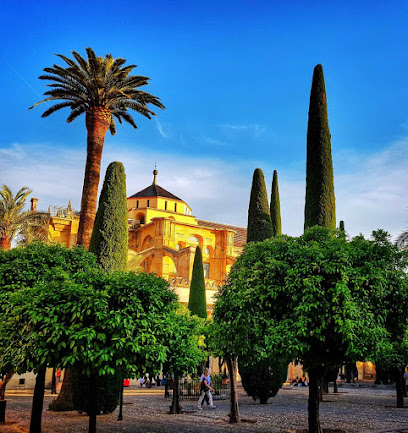
Calleja de las Flores
Discover the enchanting Calleja de las Flores, a historical landmark in Córdoba, adorned with vibrant flowers and rich architectural beauty.
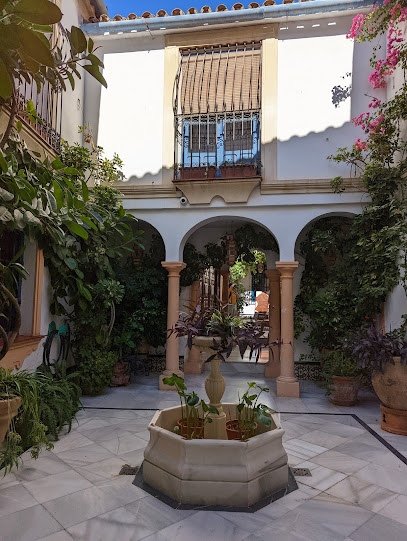
Las Casas de la Judería de Córdoba
Discover the historical elegance and modern comforts at Las Casas de la Judería, your gateway to the enchanting Jewish Quarter of Córdoba.
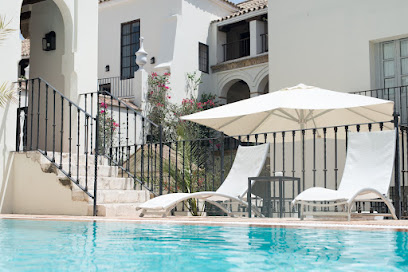
Casa Andalusí
Explore the architectural wonders and rich history of Andalusia at Casa Andalusí, a museum that brings the past to life in the heart of Córdoba.
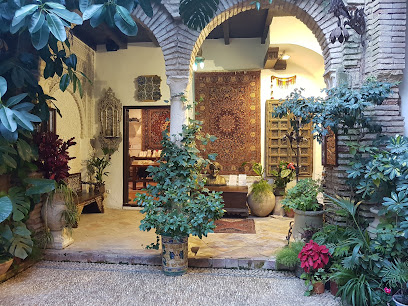
Baños Árabes de Santa María
Experience the timeless allure of Baños Árabes de Santa María, where history meets relaxation in the heart of Córdoba's rich cultural landscape.
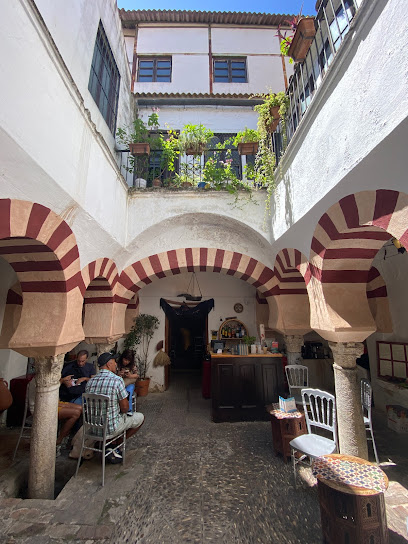
Judería de Cordoba
Discover the enchanting historical district of Judería de Córdoba, a captivating blend of culture, architecture, and culinary delights in the heart of Spain.
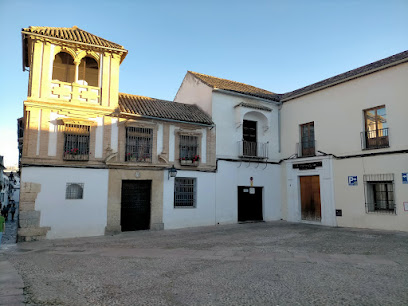
La Llave de la Judería Hotel Boutique
Experience the charm of Córdoba at La Llave de la Judería Hotel Boutique, where history meets modern comfort in a vibrant setting.
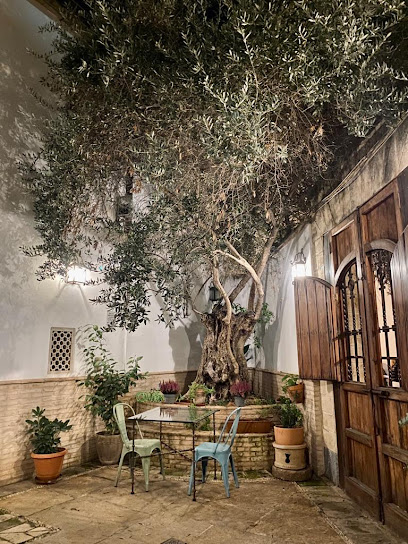
Hotel Monumento La Ermita Suites
Immerse yourself in the history and elegance of Córdoba at Hotel Monumento La Ermita Suites, where luxury meets tradition in the heart of the city.
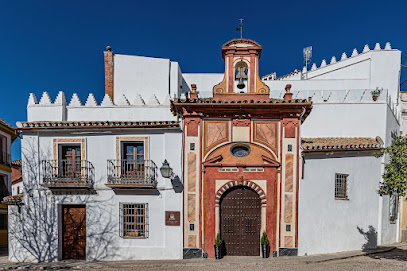
Los Patios de la Juderia
Immerse yourself in the beauty of Córdoba at Los Patios de la Juderia, where traditional Andalusian charm meets modern comfort in a serene setting.
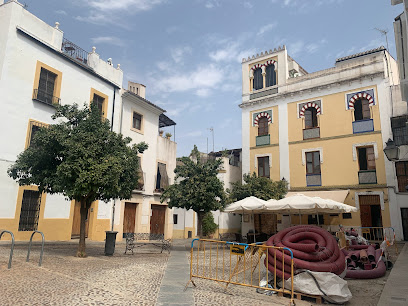
ZZ TOP
Discover the vibrant ZZ TOP youth hostel in Córdoba, where comfort meets culture in an affordable and welcoming atmosphere.
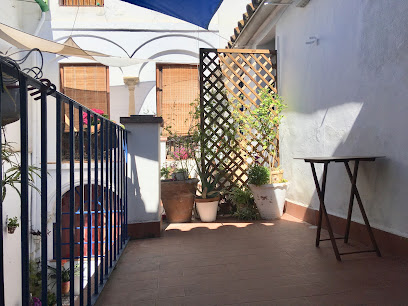
El Zaguán de la Judería
Discover the charm of Córdoba at El Zaguán de la Judería, your cozy holiday apartment rental in the heart of Andalusia's rich culture and history.
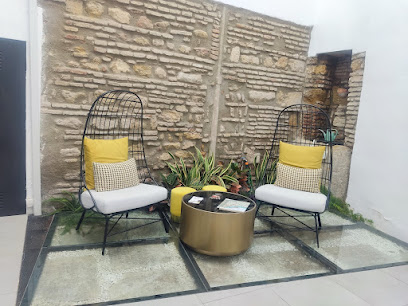
Murallas del Castillo de la Judería
Discover the rich history and stunning views at the Murallas del Castillo de la Judería, a captivating castle in the heart of Córdoba, Spain.
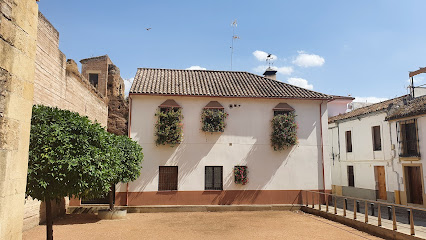
Puerta de la Luna
Explore the historical significance of Puerta de la Luna, a breathtaking landmark in Córdoba reflecting the city’s rich cultural heritage.
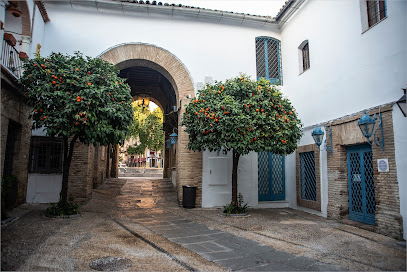
APARTAMENTOS en la Juderia de CORDOBA (TANA´S HOME) / (EL PALACIO DEL INDIANO)
Discover the beauty and culture of Córdoba from the comfort of Tana's Home, an authentic Andalusian holiday apartment in the historic Judería.
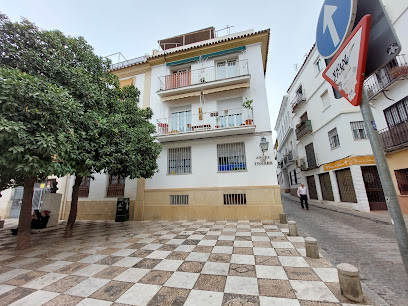
Unmissable attractions to see
Córdoba Synagogue
Explore the Córdoba Synagogue, an architectural gem showcasing the rich Jewish heritage and cultural fusion in the heart of Córdoba.
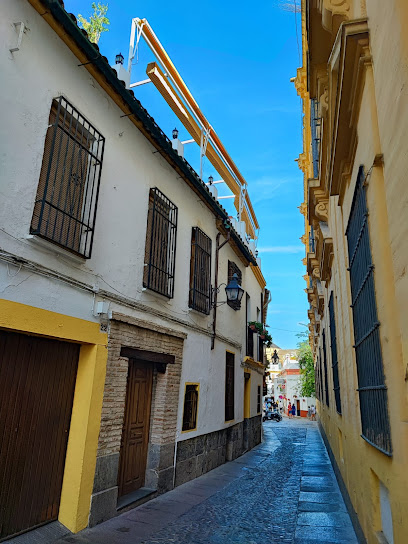
Monumento a Los Enamorados
Discover the Monument to Lovers in Córdoba—a breathtaking tribute to romance surrounded by gardens and rich cultural history.
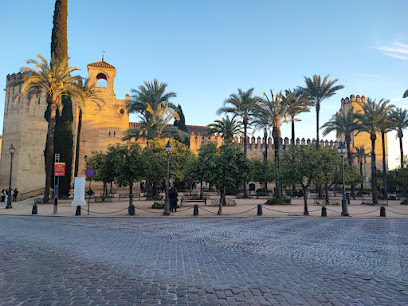
Monumento a Ibn Zaydun y la princesa Valada
Explore the enchanting Monument to Ibn Zaydun and Princess Valada in Córdoba, a beautiful tribute to love and poetry in the heart of Andalusia.
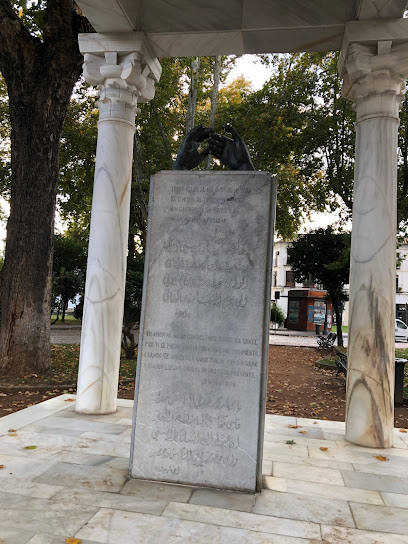
Velázquez Bosco Street
Discover the enchanting Velázquez Bosco Street in Córdoba, a charming alley filled with history, culture, and local delights.
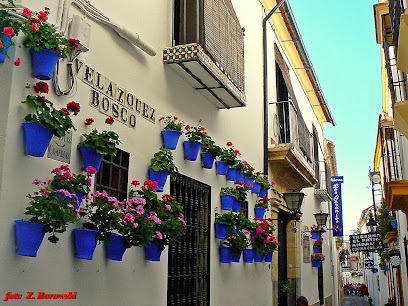
Essential places to dine
Casa Pepe de La Judería
Experience authentic Andalusian cuisine at Casa Pepe de La Judería – where tradition meets flavor in every bite.
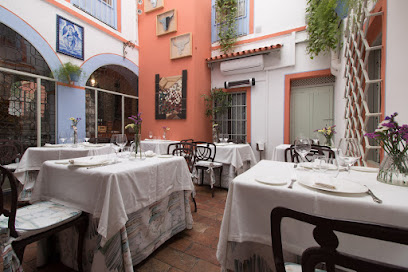
Restaurante Patio de la Judería
Experience authentic Andalusian flavors at Restaurante Patio de la Judería in Córdoba - a culinary gem with delicious tapas and enchanting ambiance.
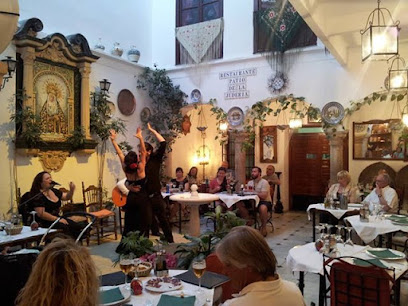
La esquinita de la juderia
Discover authentic Andalusian flavors at La Esquinita de la Judería, a charming bar and restaurant in the heart of Córdoba.
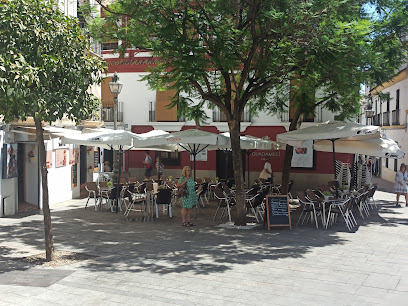
Restaurante La Esquinita de la Judería El Patio
Experience authentic Andalusian cuisine at La Esquinita de la Judería El Patio in Córdoba - where tradition meets flavor in every dish.
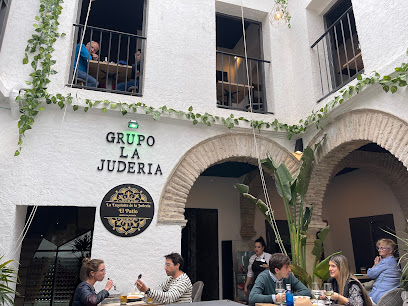
Restaurante Casa Rubio
Experience authentic Spanish cuisine at Restaurante Casa Rubio in Córdoba – home to exquisite tapas and regional delights in a vibrant setting.
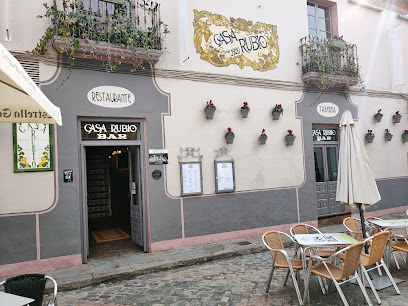
Restaurante El Rincon De Carmen
Experience authentic Mediterranean and Spanish cuisine at Restaurante El Rincon De Carmen in Córdoba's vibrant Centro district.
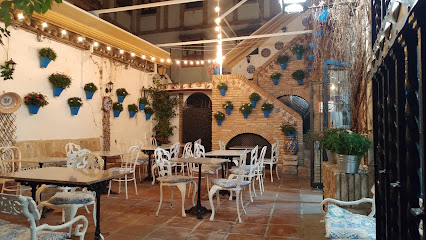
Taberna El Nº10
Savor the rich flavors of Andalusia at Taberna El Nº10, where authentic tapas meet vibrant atmosphere in the heart of Córdoba.
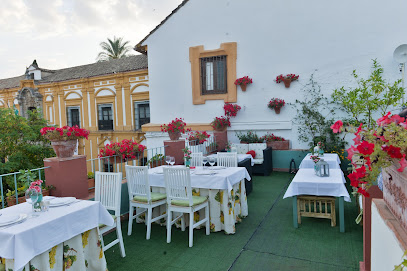
Casa Mazal Restaurante Sefardí
Discover authentic Sephardic and Mediterranean flavors at Casa Mazal in Córdoba's vibrant center.
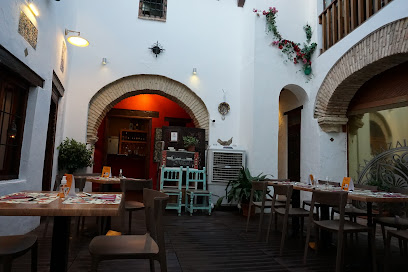
Las Tapas de Casa Pepe
Discover authentic Spanish cuisine at Las Tapas de Casa Pepe, where every bite tells a story of Córdoba's rich culinary heritage.
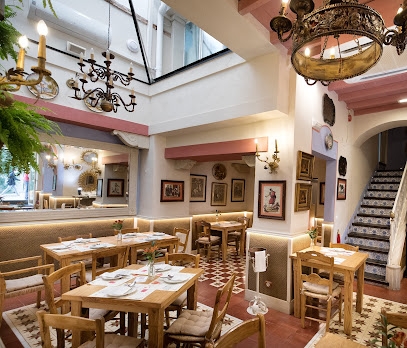
Pairi Daeza
Discover culinary artistry at Pairi Daeza in Córdoba - where tradition meets innovation in every delicious dish.
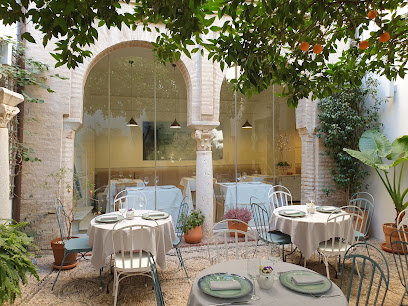
Markets, malls and hidden boutiques
ALE-HOP
Explore ALE-HOP in Córdoba for unique gifts, trendy fashion, and home goods that encapsulate the essence of Spanish culture.
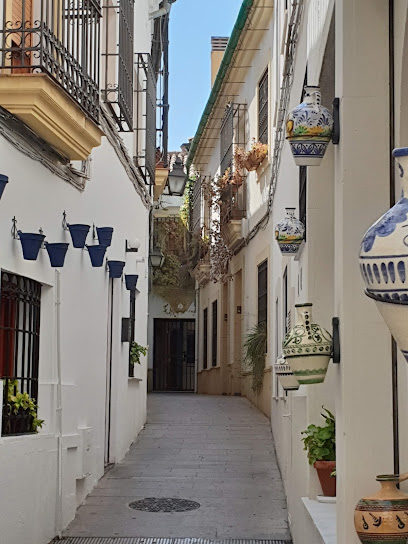
Zoco Municipal de Artesanía
Explore Zoco Municipal de Artesanía, a vibrant artisan market in Córdoba showcasing unique handmade treasures and local craftsmanship at its finest.
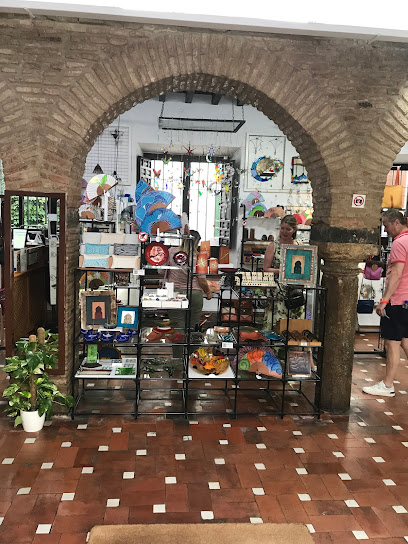
D I S I M U S A Concept Store
Explore the artistic charm of D I S I M U S A Concept Store in Córdoba, offering unique fashion accessories, handcrafted jewelry, and local artistry.
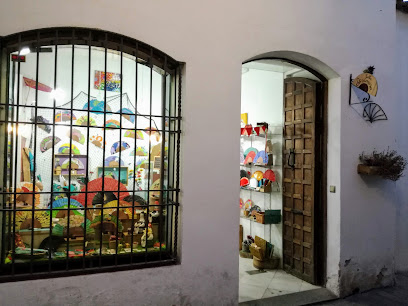
PIPIOLA boutique en Córdoba
Explore PIPIOLA boutique in Córdoba for stylish women's clothing, unique fashion accessories, and exquisite haute couture that reflect your personal style.
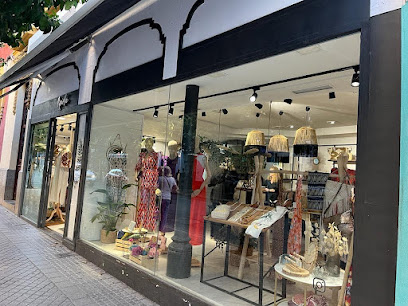
Simplemente Córdoba by Sol Courrege Boné
Discover the heart of Córdoba's craftsmanship at Simplemente Córdoba, a unique gift shop featuring local artisans and exquisite souvenirs.
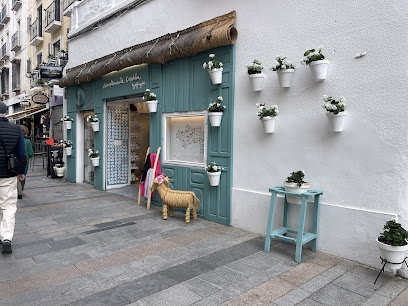
Souvenirs Judería
Explore the charm of Córdoba at Souvenirs Judería, where authentic keepsakes reflect the city's rich heritage and artistic traditions.
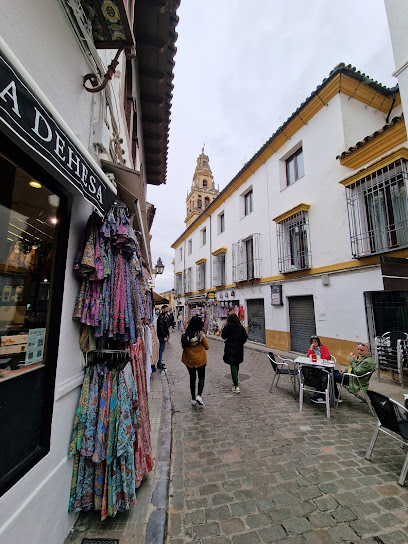
Karam
Discover Karam, Córdoba's premier gift shop, offering unique souvenirs and local crafts that celebrate Andalusian culture and artistry.
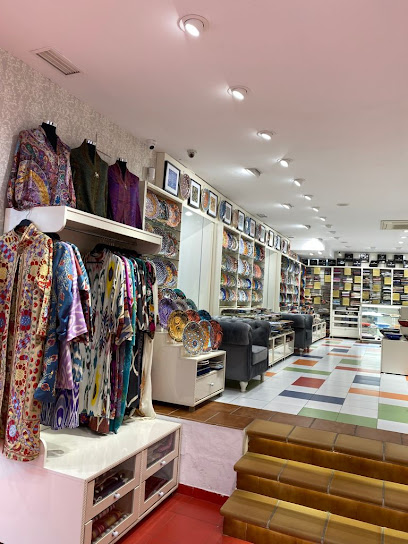
Al Maysar
Explore Al Maysar, a charming gift shop in Córdoba, offering unique souvenirs that capture the essence of this historic city.
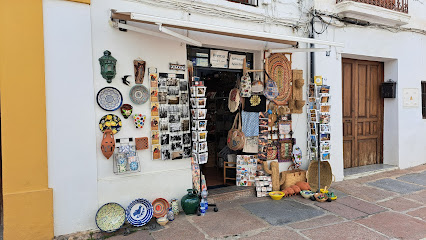
Albolafia
Discover unique souvenirs and artisanal crafts at Albolafia, the heart of Córdoba's vibrant gift shopping scene.
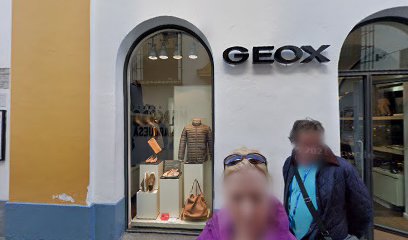
Judería 15
Explore Judería 15 in Córdoba for unique handmade gifts that capture the spirit of this beautiful Spanish city.
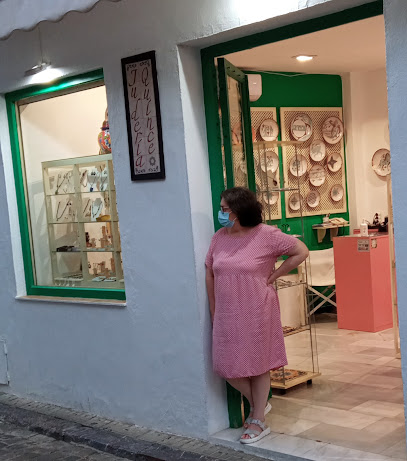
Echarpes shop
Discover the exquisite craftsmanship of Córdoba at the Echarpes shop, where vibrant colors meet elegant designs, perfect for gifts or personal style.
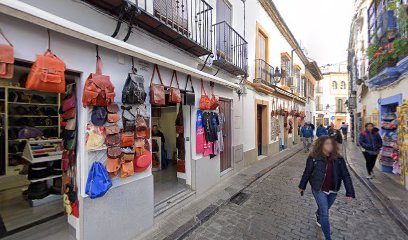
Josefa Núñez Cabello
Discover unique local crafts and souvenirs at Josefa Núñez Cabello, a charming gift shop in the heart of Córdoba, Spain.
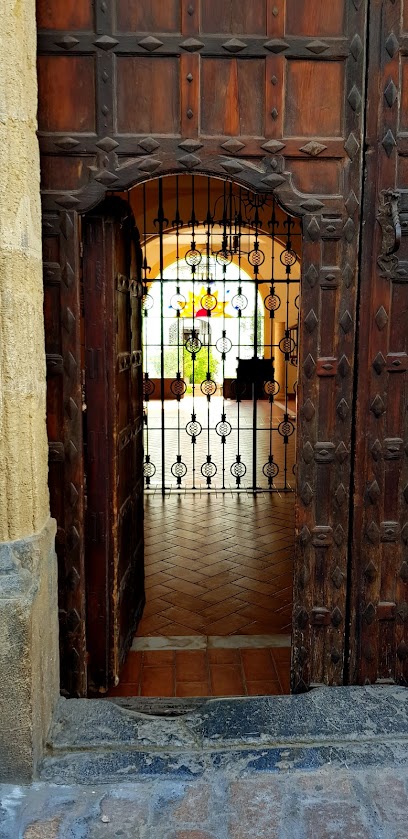
Cork Spain
Explore Cork Spain for unique gifts and souvenirs that capture the essence of Córdoba's culture and craftsmanship.
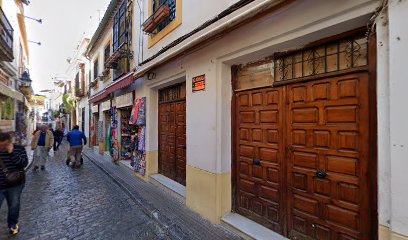
Essential bars & hidden hideouts
Casa Pepe de La Judería
Discover the authentic flavors of Andalusia at Casa Pepe de La Judería, where tradition meets culinary excellence in the heart of Córdoba.
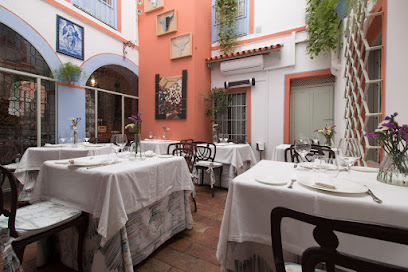
Restaurante Patio de la Judería
Discover the essence of Andalusian cuisine at Restaurante Patio de la Judería, where authentic flavors meet cultural charm in the heart of Córdoba.
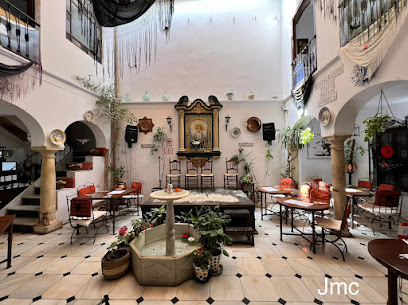
La esquinita de la juderia
Discover the authentic taste of Andalusia at La Esquinita de la Judería, where tradition meets flavor in the heart of Córdoba.
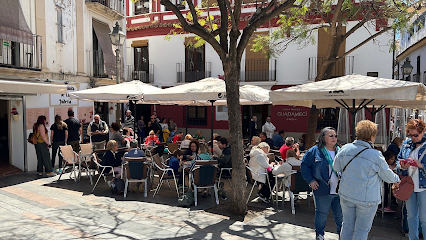
Restaurante La Esquinita de la Judería El Patio
Savor authentic Spanish cuisine in a charming Andalusian setting at Restaurante La Esquinita de la Judería El Patio.
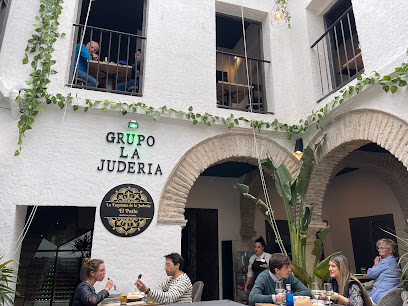
Taberna El Abanico Mezquita - Tapas Córdoba
Discover the authentic taste of Córdoba at Taberna El Abanico, where every bite tells a story of Spanish culinary tradition.
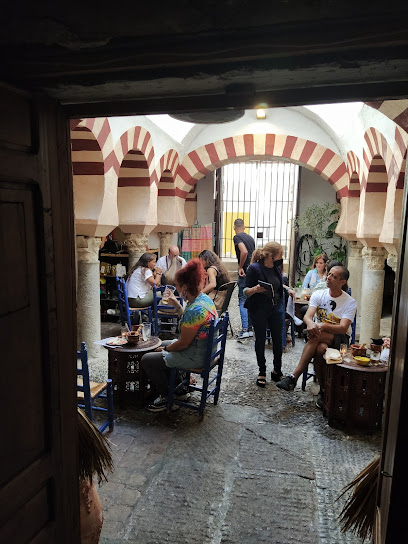
Gran Bar
Experience the vibrant flavors and lively atmosphere of Gran Bar in Córdoba, where tapas and local wines create unforgettable memories.
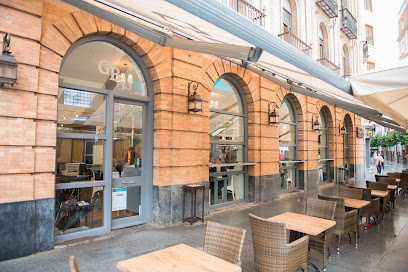
Taberna El Nº10
Discover the flavors of Andalucía at Taberna El Nº10, a charming tavern in Córdoba offering authentic tapas and a warm, inviting atmosphere.
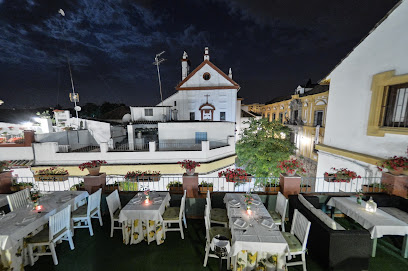
Cafe - Bar La Cavea
Discover the heart of Córdoba at Cafe - Bar La Cavea, where delightful coffee and vibrant tapas await in a cozy atmosphere.
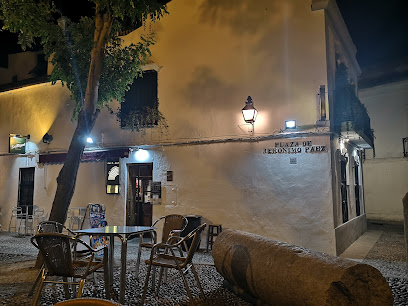
Bar la uva
Discover the exquisite tapas and delightful pastries at Bar la Uva, a must-visit bar in the heart of Córdoba's vibrant culinary scene.
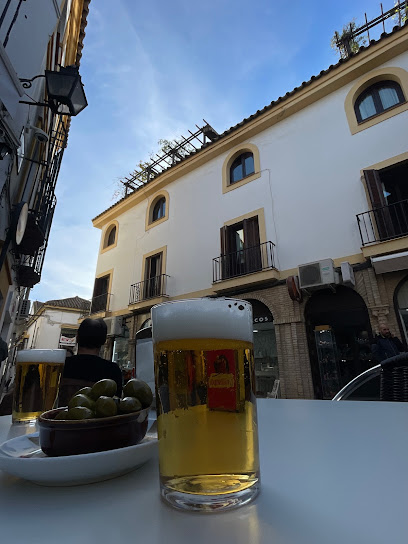
La Indiscreta bar
Experience the vibrant nightlife of Córdoba at La Indiscreta, where superb cocktails meet delicious tapas in a cozy atmosphere.
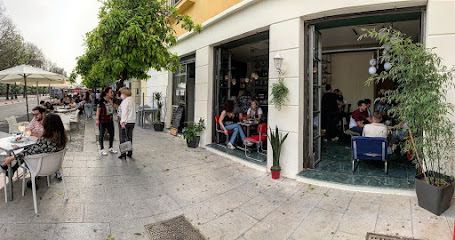
Los Perritos de la Judería
Discover the authentic flavors of Córdoba at Los Perritos de la Judería, your go-to tapas bar for a true Spanish culinary experience.
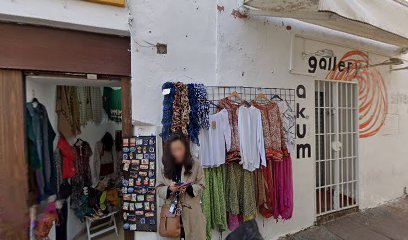
Local Phrases
-
- HelloHola
[oh-lah] - GoodbyeAdiós
[ah-thyohs] - YesSí
[see] - NoNo
[noh] - Please/You're welcomePor favor/De nada
[por fah-vor/deh nah-dah] - Thank youGracias
[grah-thyahs] - Excuse me/SorryPerdón/Lo siento
[pehr-dohn/loh syehn-toh] - How are you?¿Cómo estás?
[koh-moh ehs-tahs] - Fine. And you?Bien. ¿Y tú?
[byen. ee too] - Do you speak English?¿Hablas inglés?
[ah-blahs een-glehs] - I don't understandNo entiendo
[noh ehn-tyen-doh]
- HelloHola
-
- I'd like to see the menu, pleaseMe gustaría ver la carta, por favor
[meh goos-tah-ree-ah vehr lah kahr-tah, por fah-vor] - I don't eat meatNo como carne
[noh koh-moh kahr-neh] - Cheers!¡Salud!
[sah-looth] - I would like to pay, pleaseMe gustaría pagar, por favor
[meh goos-tah-ree-ah pah-gahr, por fah-vor]
- I'd like to see the menu, pleaseMe gustaría ver la carta, por favor
-
- Help!¡Ayuda!
[ah-yoo-dah] - Go away!¡Vete!
[veh-teh] - Call the Police!¡Llama a la policía!
[yah-mah ah lah poh-lee-see-ah] - Call a doctor!¡Llama a un médico!
[yah-mah ah oon meh-dee-koh] - I'm lostEstoy perdido/a
[ehs-toy pehr-dee-doh/dah] - I'm illEstoy enfermo/a
[ehs-toy ehn-fehr-moh/dah]
- Help!¡Ayuda!
-
- I'd like to buy...Me gustaría comprar...
[meh goos-tah-ree-ah kohm-prahr] - I'm just lookingSolo estoy mirando
[soh-loh ehs-toy mee-rahn-doh] - How much is it?¿Cuánto cuesta?
[kwan-toh kwes-tah] - That's too expensiveEso es demasiado caro
[eh-soh ehs deh-mah-syah-doh kah-roh] - Can you lower the price?¿Puedes bajar el precio?
[pweh-dehs bah-har ehl preh-syo]
- I'd like to buy...Me gustaría comprar...
-
- What time is it?¿Qué hora es?
[keh oh-rah ehs] - It's one o'clockEs la una en punto
[ehs lah oo-nah ehn poon-toh] - Half past (10)Y media (10)
[ee meh-thyah (dheey-see-ahs)] - MorningMañana
[mah-nyah-nah] - AfternoonTarde
[tahr-deh] - EveningNoche
[noh-cheh] - YesterdayAyer
[ah-yehr] - TodayHoy
[oy] - TomorrowMañana
[mah-nyah-nah] - 1Uno
[oo-noh] - 2Dos
[dohs] - 3Tres
[trehs] - 4Cuatro
[kwa-troh] - 5Cinco
[theen-koh] - 6Seis
[sehs] - 7Siete
[syeh-teh] - 8Ocho
[oh-choh] - 9Nueve
[nweh-veh] - 10Diez
[dyeth]
- What time is it?¿Qué hora es?
-
- Where's a/the...?¿Dónde está...?
[dohn-deh ehs-tah] - What's the address?¿Cuál es la dirección?
[kwahl ehs lah dee-rehk-syohn] - Can you show me (on the map)?¿Puedes mostrarme (en el mapa)?
[pweh-dehs mohs-trahr-meh (ehn ehl mah-pah)] - When's the next (bus)?¿Cuándo es el próximo (autobús)?
[kwan-doh ehs ehl proh-ksy-moh (ow-toh-booos)] - A ticket (to ....)Un billete (a ....)
[oon bee-yeh-teh (ah)]
- Where's a/the...?¿Dónde está...?
History of La Judería
-
La Judería, the historic Jewish quarter of Córdoba, dates back to the 10th century, during the time of the Caliphate of Córdoba. It became a vibrant center for Jewish culture and scholarship, flourishing alongside the city's renowned Muslim and Christian communities. The neighborhood's narrow, winding streets and whitewashed houses reflect its medieval heritage, and it was here that Jewish philosophers such as Maimonides were born and raised.
-
During the 11th and 12th centuries, La Judería reached its zenith as a hub of Jewish intellectual and cultural life. The neighborhood featured synagogues, schools, and libraries, making it a beacon of learning in medieval Europe. The coexistence of Jews, Christians, and Muslims in Córdoba facilitated a unique cultural exchange that enriched the arts, philosophy, and sciences, contributing to the advancements of the time.
-
The expulsion of Jews from Spain in 1492 marked a tragic turning point for La Judería. Following the Reconquista and the establishment of Catholic monarchs Ferdinand and Isabella, many Jews were forced to convert to Christianity or leave the country altogether. This event led to the decline of the once-thriving Jewish community in Córdoba, with many fleeing to North Africa, the Ottoman Empire, and other regions.
-
La Judería is home to several significant architectural landmarks that reflect its rich history. The 14th-century Synagogue of Córdoba, one of the few surviving medieval synagogues in Spain, showcases an exquisite Mudéjar style, featuring intricate plasterwork and a beautiful wooden ceiling. The neighborhood also contains remnants of ancient Jewish homes, which have been preserved as a testament to the cultural legacy of the Jewish community in Córdoba.
-
In recent decades, La Judería has experienced a cultural revival driven by increased interest in Jewish heritage. The establishment of the Casa de Sefarad, a museum dedicated to the history and culture of Sephardic Jews, has become a focal point for education and tourism. Annual events such as the 'Festival of the Three Cultures' celebrate the coexistence of Jewish, Christian, and Muslim traditions, reaffirming Córdoba's historical role as a crossroads of cultures.
La Judería Essentials
-
La Judería is centrally located in Córdoba, making it easily accessible from other neighborhoods. From the main train station, Córdoba Central, you can take a short taxi ride or use local buses that frequently connect to the city center. If you're arriving by car, there are nearby parking lots, but be prepared for narrow streets and limited parking in the historic area.
-
La Judería is best explored on foot due to its narrow, winding streets and pedestrian-friendly layout. Public buses are available but may not provide access to the more intimate corners of the neighborhood. Bicycles can be rented from various shops in Córdoba, but navigating the old streets may be challenging. Taxis are also an option if needed.
-
La Judería is generally safe for tourists, but as in any tourist area, it's wise to remain vigilant. Petty crime, such as pickpocketing, can occur, particularly in crowded areas like the Mezquita-Catedral and popular plazas. Avoid walking alone late at night in less populated streets, and keep personal belongings secure.
-
In case of an emergency, dial 112 for police, medical, or fire assistance. Local hospitals and clinics are available in Córdoba. It is advisable to have travel insurance that covers emergencies. For minor health issues, pharmacies are located throughout La Judería.
-
Fashion: Do wear comfortable shoes suitable for walking, and dress modestly when visiting religious sites. Religion: Do respect local customs; cover your shoulders and knees in churches. Public Transport: Do be courteous on public transport and give up your seat for those in need. Don't eat or drink on public transport. Greetings: Do greet locals with a friendly 'Hola' or 'Buenos días.' Eating & Drinking: Do savor local dishes and try tapas. Don't rush through meals; dining is a social experience.
-
To experience La Judería like a local, explore the neighborhood's hidden patios, many of which are less touristy. Visit the local markets and try the salmorejo, a cold tomato soup unique to Andalusia. Engage with local artisans in the craft shops and inquire about their work. Attend a flamenco show in an intimate setting for an authentic cultural experience.
Trending Landmarks in La Judería
-
Mosque-Cathedral of Córdoba
-
Patio de los Naranjos
-
Calleja de las Flores
-
Las Casas de la Judería de Córdoba
-
Casa Andalusí
-
Baños Árabes de Santa María
-
Judería de Cordoba
-
La Llave de la Judería Hotel Boutique
-
Hotel Monumento La Ermita Suites
-
Los Patios de la Juderia
-
ZZ TOP
-
El Zaguán de la Judería
-
Murallas del Castillo de la Judería
-
Puerta de la Luna
-
APARTAMENTOS en la Juderia de CORDOBA (TANA´S HOME) / (EL PALACIO DEL INDIANO)
Nearby Cities to La Judería
-
Things To Do in Ronda
-
Things To Do in Málaga
-
Things To Do in Casemates Square
-
Things To Do in Moorish Castle
-
Things To Do in Catalan Bay
-
Things To Do in Gibraltar
-
Things To Do in Main Street
-
Things To Do in Queensway Quay Marina
-
Things To Do in Alameda Botanic Gardens
-
Things To Do in Cádiz
-
Things To Do in St. Michael's Cave
-
Things To Do in Gorham's Cave Complex
-
Things To Do in Huelva
-
Things To Do in Europa Point
-
Things To Do in Badajoz










